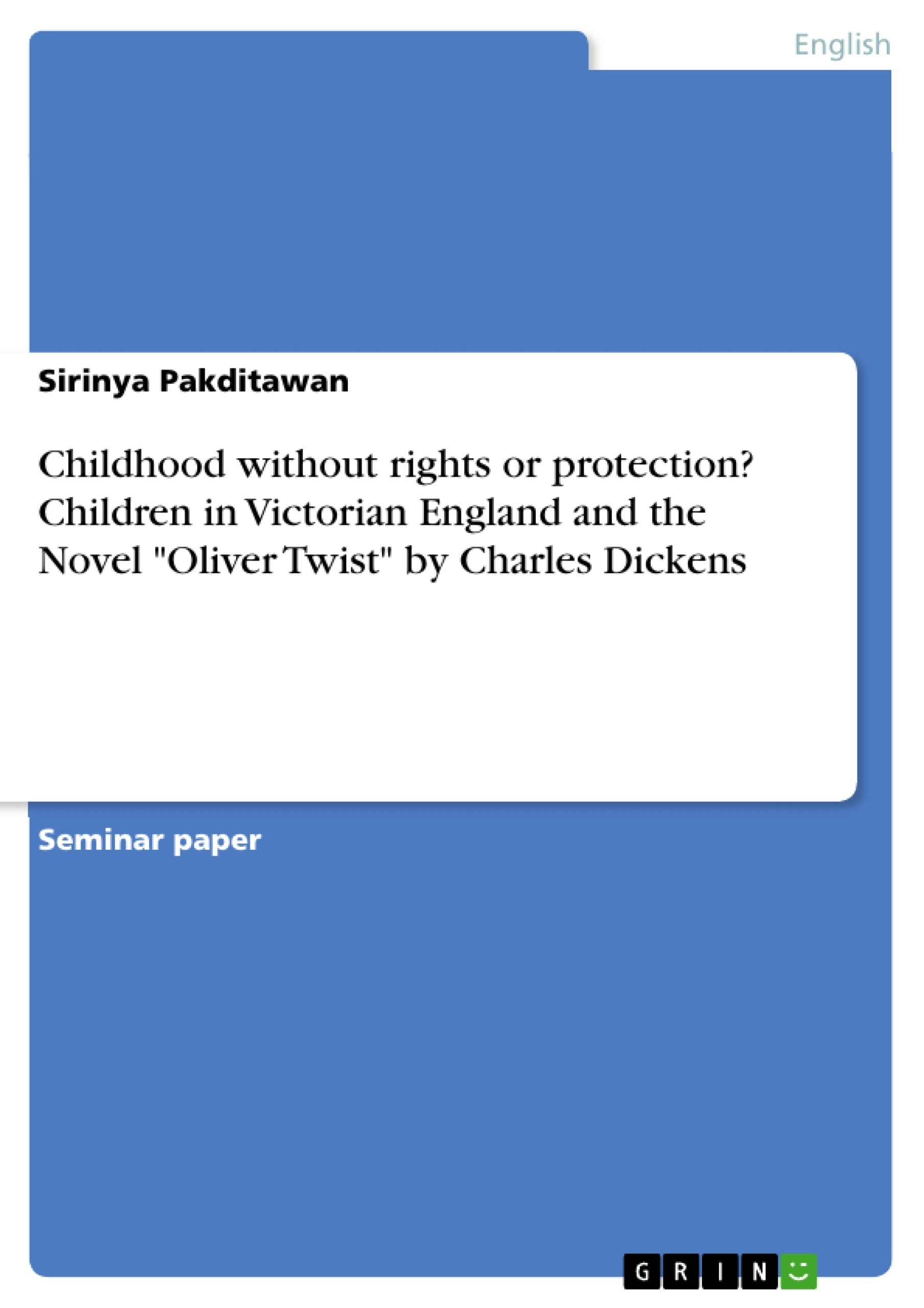Untersuchung der Recht von Kindern im viktorianischen England allgemein und in Bezug auf Dickens' Roman "Oliver Twist"
Inhaltsverzeichnis (Table of Contents)
- Introduction
- Victorian Morals and the Poor
- Poor Laws and Workhouses
- Child Labour
- Dickens' Childhood and Background
- Cold Reality of Workhouses: Oliver Twist's Social Commentary
- Conclusion
Zielsetzung und Themenschwerpunkte (Objectives and Key Themes)
This work aims to analyze Charles Dickens's novel Oliver Twist as a social commentary on the harsh realities of Victorian England. By examining the novel's depiction of workhouses, child labor, and the plight of the poor, the work explores how Dickens used his own experiences and the prevailing social conditions of his time to create a powerful critique of the English legal system and its impact on the lives of the most vulnerable members of society.
- The exploitation of child labor in Victorian England
- The harsh realities of workhouses and the Poor Laws
- Dickens's own childhood experiences and their influence on his writing
- The social commentary of Oliver Twist and its impact on social reform
- The relationship between politics and literature in the Victorian era
Zusammenfassung der Kapitel (Chapter Summaries)
The introduction provides an overview of the historical context of Oliver Twist, highlighting the pervasiveness of poverty and the lack of rights and protection for children in Victorian England. It emphasizes Dickens's personal experiences with poverty and his commitment to championing the cause of the poor.
The first chapter explores the Victorian morals and the treatment of the poor, focusing on the Poor Laws and workhouses. It details the harsh realities of life in these institutions, where children were subjected to deplorable conditions and deprived of basic necessities. This chapter provides a historical context for understanding the social injustices that Dickens sought to address.
The second chapter examines the role of child labor in Victorian England, highlighting the widespread exploitation of children in factories and mines. The chapter discusses the legal and social pressures that led to the use of child labor, as well as the devastating consequences for children's health and well-being. This chapter sheds light on the economic and social forces that shaped the lives of children in this period.
The third chapter focuses on Dickens's childhood experiences and the influence of his own background on his writing. This chapter provides personal insights into the author's motivations and how his own struggles shaped his social conscience and his commitment to portraying the realities of poverty in his work.
Schlüsselwörter (Keywords)
This work focuses on the keywords: Victorian England, Oliver Twist, Charles Dickens, poverty, child labor, workhouses, Poor Laws, social commentary, social reform, and the relationship between politics and literature. These keywords encapsulate the key themes and concepts explored in the analysis of Oliver Twist, which uses literary means to address the urgent social problems of the time.
Frequently Asked Questions
How does "Oliver Twist" serve as social commentary?
The novel critiques the harsh realities of Victorian England, specifically targeting the Poor Laws, the maltreatment of children in workhouses, and the widespread exploitation of child labor.
What were the Victorian Poor Laws?
These were laws designed to manage poverty, which led to the creation of workhouses where the poor were subjected to deplorable conditions to discourage them from seeking aid.
How did Charles Dickens's own life influence the novel?
Dickens's personal experiences with poverty and his family's financial struggles deeply shaped his social conscience and his commitment to depicting the plight of the vulnerable.
What was child labor like in Victorian England?
Children were widely exploited in factories and mines, working long hours in dangerous conditions with little to no legal protection.
Did "Oliver Twist" impact social reform?
Yes, the novel's powerful portrayal of social injustices helped raise public awareness and contributed to the momentum for legal and social reforms in the Victorian era.
- Citation du texte
- Sirinya Pakditawan (Auteur), 2001, Childhood without rights or protection? Children in Victorian England and the Novel "Oliver Twist" by Charles Dickens, Munich, GRIN Verlag, https://www.grin.com/document/186205



